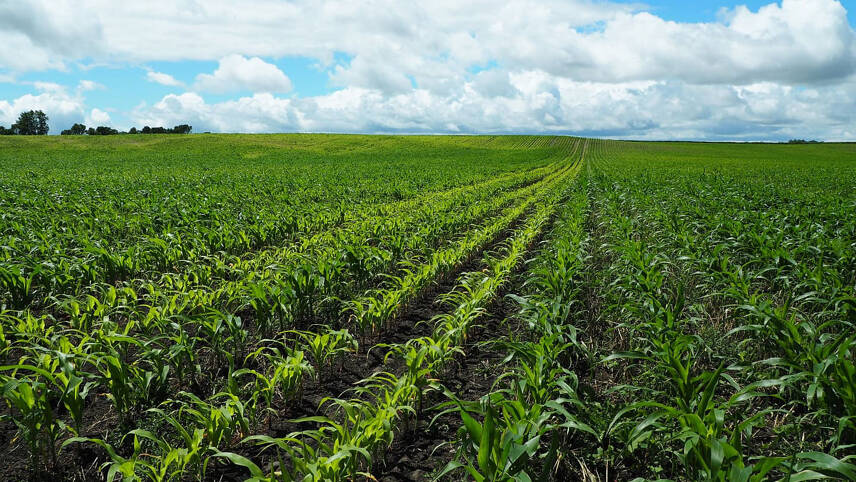Register for free and continue reading
Join our growing army of changemakers and get unlimited access to our premium content

Image: General Mills. Pictured: Corn farming in the USA.
This is according to Ceres’ Food Emissions 50 Company Benchmark, which evaluates companies in the food sector based on their progress in aligning with and accelerating the transition to a net-zero emissions economy.
Among the companies assessed are Bunge, Chipotle, Domino’s, Hershey, General Mills, Kellogg, Kraft Heinz, Kroger, McDonald’s, Papa John’s, Starbucks, Walmart and Wendy’s.
The report highlights that 37 out of 50 companies are now reporting their supply chain GHG emissions, with 32 of them setting targets to reduce these emissions.
Nevertheless, only five of the companies assessed demonstrate a business-wide strategy to integrate innovation within plans to achieve emission reduction goals. Moreover, none of the companies have aligned their future expenditures with their climate goals.
Additionally, while many companies are utilising climate scenario analysis to assess their business resilience to potential future risks, only seven have conducted a 1.5C-aligned scenario analysis addressing transition risks and opportunities, along with physical risks.
This kind of scenario analysis is recommended by the Taskforce on Climate-related Disclosures (TCFD). TCFD-aligned reporting is mandatory for big businesses in the UK but the US has no such mandate.
Ceres’ programme director of food and forests Meryl Richards said: “As more companies set targets to reduce their emissions, it is critical that they also disclose how they will transition their businesses to align with a net-zero future.
“Without climate transition plans that chart the actions companies will take to reduce their emissions, it is likely that companies will fall short of their goals.”
According to the report, only three companies screen for GHG emissions as part of their mergers and acquisitions processes, with none disclosing specific actions they will take to align new mergers and acquisitions with their emissions targets.
None of the assessed companies have disclosed targets to reduce non-CO2 emissions specifically, despite the significant climate risks posed by methane and nitrous oxide emissions from agricultural processes like livestock production and fertiliser application.
Energy and transport emissions
Regarding energy and transport emissions, while 15 companies are striving to increase clean energy sourcing, only eight have committed to transitioning to 100% clean energy by 2050.
The report emphasises that in a 1.5C scenario, power sector emissions must be reduced by 70%-92% between 2020 and 2035 and approach zero by around 2040-2045.
In addition to sourcing clean energy, increasing energy efficiency and decarbonising production processes are deemed essential to reduce emissions from energy use.
While 25 companies have invested in project-level improvements to enhance energy efficiency, none have outlined plans backed by a strategy to fully decarbonise their operations.
Additionally, only five companies disclose a business-wide strategy to promote the adoption of lower or zero-emissions transportation for both private and third-party fleets.
Scope 3 emissions
As for supply-chain emissions, although 19 companies are engaging or encouraging direct suppliers to take climate-related actions, only four have binding requirements.
While 12 companies are urging suppliers to adopt lower emissions practices, only 10 disclose providing financial and technical assistance to agricultural producers in their supply chain, with plans to scale efforts through long-term investment and collaboration.
The report also assesses deforestation policies for supply chains, which can make or break net-zero plans. Moreover, a lack of preparation around ecosystem resilience may expose food companies to future risks such as commodity scarcity.
While 12 companies have some deforestation commitments, Hershey and Bunge stand out as the only two companies committed to achieving and demonstrating a deforestation and conversion-free supply chain by 2025.


Please login or Register to leave a comment.